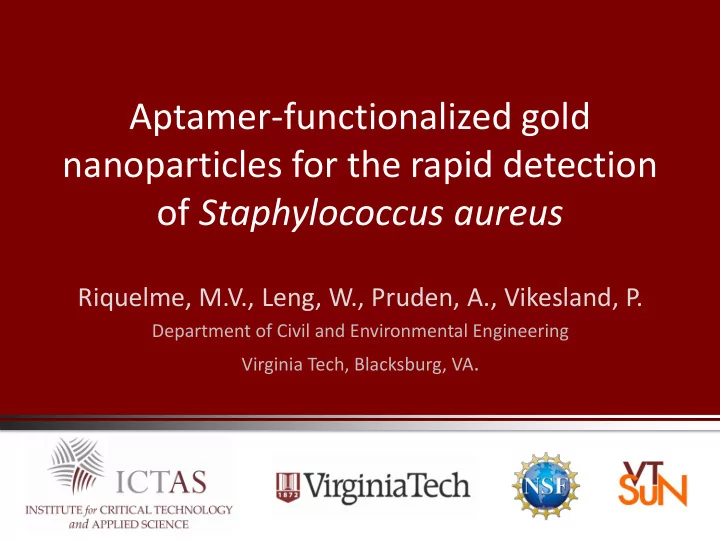

Aptamer-functionalized gold nanoparticles for the rapid detection of Staphylococcus aureus Riquelme, M.V., Leng, W., Pruden, A., Vikesland, P. Department of Civil and Environmental Engineering Virginia Tech, Blacksburg, VA .
Staph loves humans! Annals of Clinical Microbiology and Antimicrobials 2006, 5 :2 doi:10.1186/1476-0711-5-2 • Carried by ~30% of healthy individuals • Nosocomial and community acquired infections • 40-60% resistant to multiple antibiotics (MRSA) • Current detection methods are culture dependent
Staph in the environment Environmental reservoirs of S. aureus and MRSA: – Public surfaces (Currency, public transport, etc.) – Food and food environments – Animals/wildlife – Beaches – Drinking water supplies worldwide – Wastewater Need fast, simple, reliable detection mechanisms
Nanosensors Detection system: Aptamer • Sensor: Aptamer + Raman active molecule • Transducer: Raman Spectroscopy Raman-active Raman molecule spectroscopy Benefits and sustainability: • Detect environmental pathogens and contaminants of concern • Minimize sample volume, target concentration, and detection time • Increase efficiency, sensitivity • Enable in vivo and in situ detection • Minimize sample preparation and perturbation required • Decrease material use and waste volumes
Aptamers • Nucleic acid molecules that have been selectively enriched based on their binding affinity to a particular target (e.g., bacterial cell, virus, molecule, etc.) Nature Protocols 5 , 1169 – 1185 doi:10.1038/nprot.2010.66 • Enrichment process: Systematic Evolution of Ligands by Exponential Enrichment (SELEX) Cao et al. 2008
Raman & SERS � Rule & Vileskand, 2009 - DOI: 10.1021/es801531t http://www.doitpoms.ac.uk/tlplib/raman/method.php Lou et al., 2011 – DOI: 10.1007/s00216-011-5067-3
Aggregation-based target detection Pathogen detectio n ARG Colorimetric detection detection (red-shift of surface plasmons) � SERS-based detection 200 nm � Rule & Vileskand, 2009 - DOI: 10.1021/es801531t
Apt-AuNP functionalization
Target detection assay Bacterial culture Apt-AuNPs Mixture incubated ( S. aureus or @ 37 oC for 1 hr negative controls) �
S. aureus- specific detection
S. aureus- specific detection S. intermedius + Sa31_AuNPs S. aureus + Sa43_AuNPs
S. aureus quantitation 3500 30,000 cells 3000 10k 300 cells 2500 Counts 1k 2000 Counts 100 1500 S. aureus S. epidermidis 1000 3000 cells 500 0 a s s E. fa e c ium E.c ol i co ntrol e u d i s o i r g in m u a r e u . S d r i e . ep a . P S �
Different Apt-AuNPs …
Acknowledgements
Recommend
More recommend